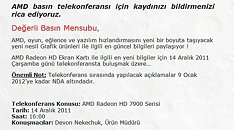Monday, December 12th 2011

January 9 Launch Date for AMD Radeon HD 7900
Ladies and Gentlemen with graphics card upgrade plans, circle the date January 09, 2012, for this is going to be the day AMD will launch its next generation high-performance graphics cards in the Radeon HD 7900 series, according to reliable market sources DonanimHaber spoke with. On the 9th, AMD is expected to unveil at least two new SKUs in the HD 7900 series, most likely, HD 7970 and HD 7950. These will be based on the new 28 nm "Tahiti" silicon that will use completely redesigned number-crunching machinery, and a very wide memory bus.
Source:
DonanimHaber

146 Comments on January 9 Launch Date for AMD Radeon HD 7900
www.techpowerup.com/reviews/Powercolor/HD_6950_Vortex_II/30.html
If you need to ask, I wouldn't expect you to understand. With reference, you most the time get a good sample. Reference boards are all made by Sapphire (PCPartner), while non-ref's are unknown. That's why they tend to have better QC and mess up less.
For example my first 6870 could over-clock to 1100mhz and do 1000mhz with no additional voltage.
My second 6870 can't go over 960mhz without jibbing out.
My cards were identical in every other way ( reference design by the way with the fancy voltage control and such ;) )
VisionTek 900352 Radeon HD 6950 2GB 256-bit GDDR5 ...
I see the same variation regardless of whether it's reference or not.
In fact some of the highest over clocks I've seen are on non reference cards.
How ever I know it's all down to luck, any over-clocking always is.
I don't just speak from my experience either, I speak from this forums entirely collective user-base XD
See now I get what your saying, but the way you were saying it was well not right :laugh:
Should of gone with that statement straight away, save yourself all the grief you got :)
And when the PowerColor card was ran at ~1.2v(or 1.19v maybe, the graph is a little hard to read exact voltages) it hits 965MHz, so 35MHz more than the reference with the Volterra when using the same voltages.
Not a great example... Keep trying there John Doe.
Yep, those reference cards will definitely give you a great overclock. Guaranteed!</sarcasm>You keep saying that, but have yet to show any proof. And the proof you tried to show just made you look worse. As I said, keep trying.
Yeah, I can understand the brick wall thing, you just keep posting things and I just keep shooting them down for the BS they are... I can understand that becoming frustrating.
C-c-c-c-combo Breaker!
It's like buying a £35 motherboard and expecting it to be as good as a £200 one.
If you get the non reference cards that are the same price or more expensive than a reference one you'll typically get decent over-clocking headroom unless your unlucky.
Anyway, think that's me done in this thread.
Way off topic :laugh:
Shall we make a new thread to discuss reference vs 3rd party designs?
First overclocking result are promising but I wish W1zz would fix GPU-z
www.techpowerup.com/forums/attachment.php?attachmentid=44657&stc=1&d=1323750651
Wait until I get it under water though :)
Can you guess how long an obstacle is by looking at it? You have to measure it. This is ironic.